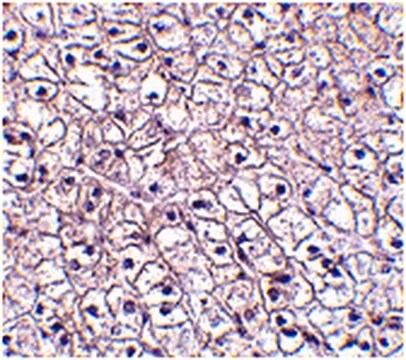GS65
GST M1-1, Recombinant Human
Sinónimos:
GST1, GSTM1-1, GSTM1a-1a, GSTM1b-1b, GTH4, GTM1, H-B, MU, MU-1, glutathione S-transferase mu 1
About This Item
Productos recomendados
origen biológico
human
Nivel de calidad
recombinante
expressed in E. coli
Ensayo
>95% (SDS-PAGE)
Formulario
frozen liquid
actividad específica
97.96 units/mg protein
mol peso
26 kDa
concentración
3.1 mg/mL
temp. de almacenamiento
−70°C
Información sobre el gen
human ... GSTM1(2944)
Descripción general
Acciones bioquímicas o fisiológicas
Almacenamiento y estabilidad
Código de clase de almacenamiento
10 - Combustible liquids
Clase de riesgo para el agua (WGK)
WGK 1
Punto de inflamabilidad (°F)
Not applicable
Punto de inflamabilidad (°C)
Not applicable
Elija entre una de las versiones más recientes:
Certificados de análisis (COA)
¿No ve la versión correcta?
Si necesita una versión concreta, puede buscar un certificado específico por el número de lote.
¿Ya tiene este producto?
Encuentre la documentación para los productos que ha comprado recientemente en la Biblioteca de documentos.
Nuestro equipo de científicos tiene experiencia en todas las áreas de investigación: Ciencias de la vida, Ciencia de los materiales, Síntesis química, Cromatografía, Analítica y muchas otras.
Póngase en contacto con el Servicio técnico







